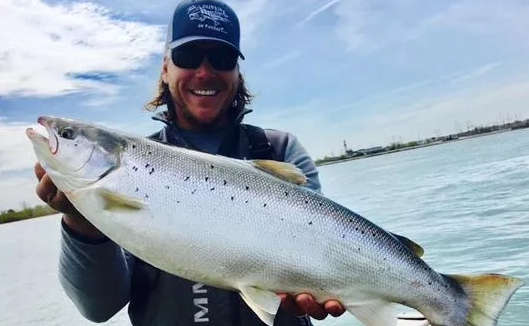This may surprise many—it certainly surprised me. Atlantic salmon were once native to Lake Ontario. They are not native to the other Great Lakes, but according to Bring Back the Salmon, a Canadian conservation group seeking to restore Atlantic salmon to Lake Ontario, this was once the case. But, that initial population of salmon has long been extinct—probably for well over a century. Efforts to restore the population continue, and the St. Mary’s River in Michigan is the best place to catch a migratory Great Lakes Atlantic salmon in American waters.
So, to say he was surprised when Detroit angler Brad Smyth pulled a 9-pound, 10-ounce salmon out of the Detroit River is an understatement. “It started thrashing, and I thought it was a snagged carp,” he told the Detroit Free-Press last week. Nope. It was gorgeous lake-run Atlantic. Nicely done.
Over the next few weeks, TU will lose one of it’s longest-tenured stream champions when Bruce Farling, executive director of Montana Trout Unlimited, officially moves on from his duties. Farling has guided TU’s efforts in Montana with steadfast courage and discipline, taking on tough issues like stream access, hard-rock mining and non-native species issues, all the while helping grow Montana’s TU membership to more than 4,300. We’ll miss Bruce’s guidance in Montana, and look forward to new MTU Executive Director David Brooks taking the reins this summer.
And, most of all, we wish Bruce the best of luck in his coming endeavors.
Some good news from Utah: the recreatoion restrictions put in place on the American Fork River after a sediment release from the Tibble Fork Dam rehabilitation project last summer have been lifted. Heavy metals in the river have returned to safe levels.
But the river still faces some challenges, as pointed out by Paul Burnett, TU’s water and habitat coordinator in Utah. The American Fork is still impaired by heavy-metals draining into the river from abandoned mines in the headwaters and other factors that exacerbate that pollution.
“Really long-term concerns are only going to be solved through a collaborative partnership,” Burnett told the Daily Herald. “One of the positive things that could come out of a spill like this is creating that framework for a partnership that could help solve some of these challenges.”
Partnerships solve problems. Let’s hope something good for the American Fork comes from the sediment spill.
— Chris Hunt



